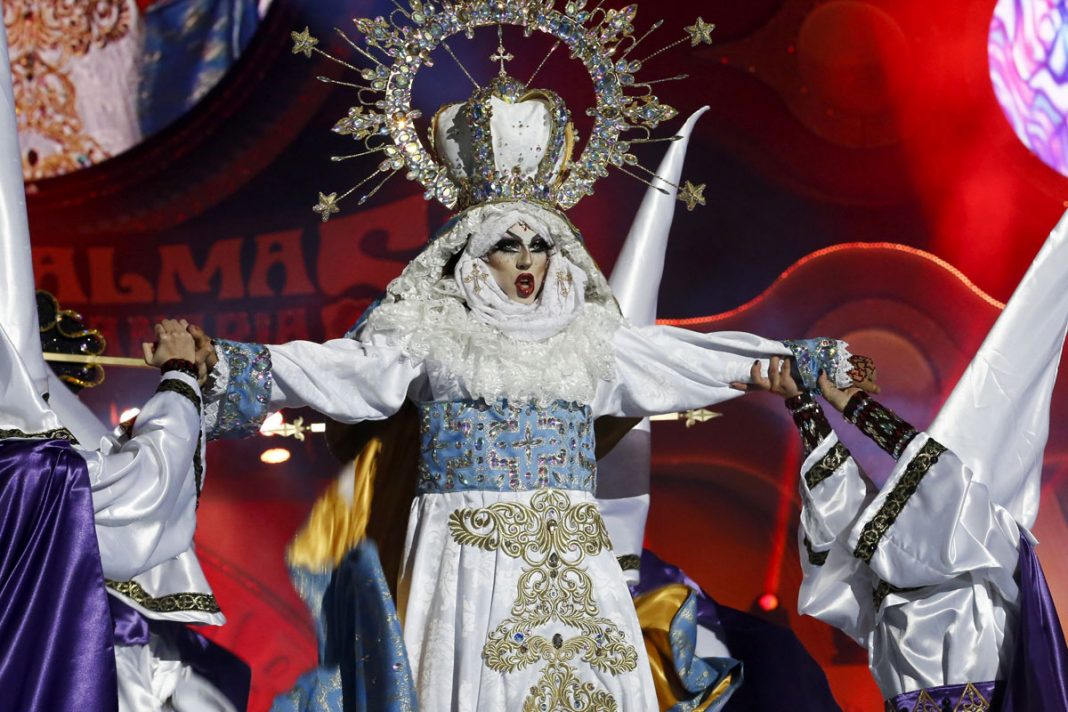In the Canary Islands, as well as in many predominantly Catholic countries around the world, we are currently enjoying a period of collective madness, commonly known as Carnival. Until a few years ago when cheap overseas travel and holidays became readily available, few British people had ever experienced or understood what Carnival was really about; it is certainly not just about amazingly gorgeous dresses, high heels and skimpily dressed girls and guys.
Carnival is part of the Christian, and mostly Catholic, festival season that takes place just before the period known as Lent. It is a period of excess and celebration involving parades, parties, as well as elements of the circus added for good measure. Masks and costumes are worn, together with an excessive consumption of alcohol and food. Food fights, mockery of authority, satire and exaggeration are the order of the day.
Abusive language, exaggerated features, such as mouths, bellies, noses and penises are all part of the fun, with gleeful depictions of death and disease being part of a time when the world is viewed through a different lens with the reversal of what passes for everyday normality.
It is in this context that various Carnival parades are currently taking place in towns and cities all across Spain and the Canary Islands. In Las Palmas de Gran Canaria, for instance, this three-week binge that culminates in a parade that is billed as ‘Second only to Rio’, vulgarity and tackiness are at their peak. In Germany too, there were raised eyebrows with one impressive float sporting a huge and colourful effigy of the UK’s Brexit Prime Minister, Theresa May, with a loaded pistol marked ‘Brexit’ pointing into her mouth, no doubt ready to blow her brains out.
Another popular float featured the ever-controversial US President Trump sexually violating the robed and tearful figure ‘Libertas’, a Roman goddess (of Statue of Liberty fame), which is not a sight for the easily offended or faint hearted, I might add, although it is surprisingly poignant in its message.
Carnival is not always comfortable, since it challenges authority and established views, as well as mocking the status quo; this was one of the reasons why the dictator, General Franco, wanted to ban it in the Canary Islands during Spain’s Civil War.
Closer to home, the winner of the Las Palmas de Gran Canaria Carnival Drag Queen competition was won by an artist with an imaginative interpretation of the Virgin Mary that cleverly morphed into Christ’s crucifixion; in so many ways, it was a well-deserved win for a talented artist.
I found myself feeling both very impressed, as well as uncomfortable by the performance, which for me was a step too far.
The Bishop of the Canary Islands waded into the controversy, reportedly describing the performance as “frivolous blasphemy”, and then unwisely commented that it was the saddest day of his time on the Canary Islands, and even more disturbing than the plane crash at Barajas airport of the flight destined for Gran Canaria that claimed the lives of 154 residents and tourists several years ago.
Such comments are not only cruel coming from a man of the cloth, but also upsetting to many people, not least the relatives and friends of the victims.
I sincerely hope that the interpretation of the Bishop’s words were down to linguistic errors and not an expression of his true feelings. If so, many would suggest a period of retreat and reflection for the good Bishop to reconcile his views with the feelings of so many who were hurt and offended by his careless comments, whatever his views about blasphemy, of which he has a point.
So, as Carnival comes to an end for another year, with the burial of that blessed sardine once again, we can only reflect and wonder upon the artistry, energy and imagination that so many performers have displayed during these weeks of excess.
On a more serious note, I hope that we are all wise enough to recognise the anger, criticism and defiance of authority that have entered the Carnival parades this year. After all, over the years, Carnival has always reflected the times that we are in; it is also a time when many true and honest feelings are genuinely expressed.
If you enjoyed this article, take a look at Barrie’s websites: http://barriemahoney.com and http://thecanaryislander.com or read his latest book, ‘Footprints in the Sand’ (ISBN: 9780995602717). Available in paperback, as well as Kindle editions.
© Barrie Mahoney





